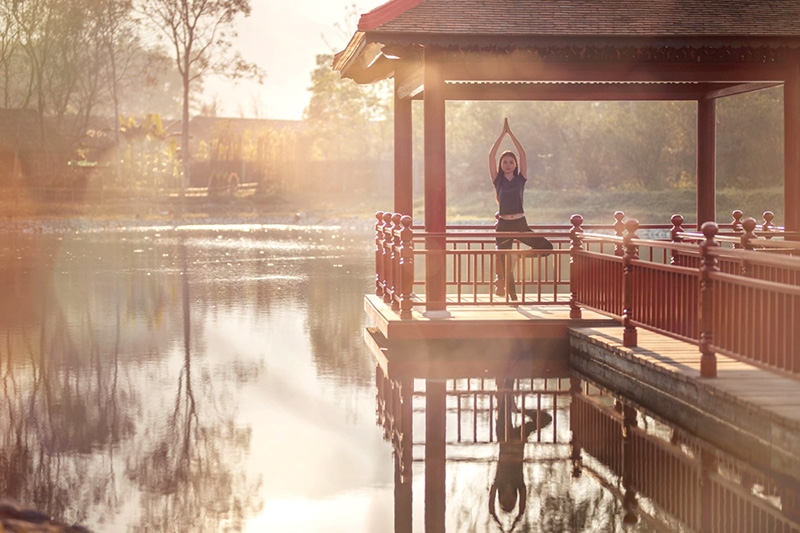Citizens prioritising healthier services
 |
| Isolation is pushing people to think more about their environment, Photo Le Toan |
According to a report released by Nielsen Vietnam last year, the ongoing pandemic has made significant changes in the behaviour of Vietnamese across various areas. Specifically, 47 per cent changed their eating habits towards healthy foods and increased the immune system, and 60 per cent changed leisure and entertainment activities and have limited going to crowded places, especially bars and pubs.
Meanwhile, 70 per cent of Vietnamese have reconsidered travel plans – instead leaning more towards wellness destinations and properties.
Architect Tran Minh Tung from the University of Civil Engineering said that the pandemic had given people new perceptions and different perspectives on life. “Social distancing has slowed down people’s lives instead of the hustle and bustle that they have been accustomed to. The isolation makes each person and family not only pay more attention to their home but also care more about the living environment around their home,” Tung said.
Investors have, as a result, firmly turned to the green real estate segment to launch products that meet the needs and tastes of customers – and, in turn, companies are also jumping on the bandwagon to ensure more comfort for workers.
“The demand for sustainable and wellness features of buildings will increase rapidly as most tenants are demanding in terms of their commitment to employee wellness, especially in facilities related to air quality, ventilation, drainage, and sanitation. This has the potential to spur the development of more certified buildings,” said Tung.
A report from Savills noted that wellness is a relatively modern trend in the global resort real estate market with the appearance of dedicated facilities and spa resorts. However, this model is still very new in Vietnam.
Do Thu Hang, senior director of Advisory Services at Savills Hanoi, shared that social distancing and working from home make people think of a “second home”, where they can focus on working remotely and studying online but taking care of their health at the same time.
“This is a product that developers must take into account when they want to diversify their products,” Hang said.
Some developers have built wellness apartments in their projects. For example, Berjaya D2D has presented its Topaz Twins with ion creation system and healthcare facilities. The Detox & Healthy apartment from Green Star Sky Garden of Phu My Hung New Urban Area, located in District 7 of Ho Chi Minh City, is another such venture. The Phu My Hung Midtown project also applied for more wellness facilities such as a sauna, massage services, and yoga into its facilities.
Meanwhile, wellness properties are also increasing in attraction in isolated destinations such as islands with natural atmosphere and faculties – especially Phu Quoc Island, with its strong infrastructure system and a rich environment for buyers.
Nguyen Van Dinh, deputy general secretary of the Vietnam Real Estate Association, said that Phu Quoc is qualified to become a destination worth living, relaxing, and retiring in, suitable for developing a robust wellness model.
Hylton Lipkin, general manager at Alba Wellness Valley by Fusion, added that the main pillars of wellness that developers must take into account involve sleep and creativity, nutrition and immunity, movement and vitality, mindfulness and serenity, and sense of purpose and solidarity.
Meanwhile, the fifth annual World Wellness Weekend is going to take place on September 18-19, 2021 across 130 countries to appreciate the wellness lifestyle.
Hylton, who has been titled as one of World Wellness Weekend’s first ambassadors in Vietnam, said that he will also approach local organisations including wellness centres, gyms, schools, associations, and local authority offices to get involved, support the cause, and further spread the advantages of wellness.
What the stars mean:
★ Poor ★ ★ Promising ★★★ Good ★★★★ Very good ★★★★★ Exceptional
Related Contents
Latest News
More News
- An Phat 5 Industrial Park targets ESG-driven investors in Hai Phong (January 26, 2026 | 08:30)
- Decree opens incentives for green urban development (January 24, 2026 | 11:18)
- Public investment is reshaping real estate’s role in Vietnam (January 21, 2026 | 10:04)
- Ho Chi Minh City seeks investor to revive Binh Quoi–Thanh Da project (January 19, 2026 | 11:58)
- Sun Group launches construction of Rach Chiec sports complex (January 16, 2026 | 16:17)
- CEO Group breaks ground on first industrial park in Haiphong Free Trade Zone (January 15, 2026 | 15:47)
- BRIGHTPARK Entertainment Complex opens in Ninh Binh (January 12, 2026 | 14:27)
- Ho Chi Minh City's industrial parks top $5.3 billion investment in 2025 (January 06, 2026 | 08:38)
- Why Vietnam must build a global strategy for its construction industry (December 31, 2025 | 18:57)
- Housing operations must be effective (December 29, 2025 | 10:00)

 Tag:
Tag:




















 Mobile Version
Mobile Version